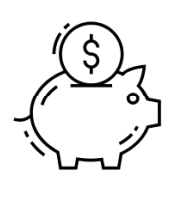Financial Freedom Defined: What If Money Wasn’t an Issue?
To ensure you get the best information, you will find ZERO ads, affiliate links, and sponsored posts on this site. Click here to learn more about my mission.
Financial freedom! What an awesome feeling it must be to achieve it. But how do you accurately define financial freedom? Is there a standard definition?
Unfortunately, there isn’t. In fact, financial freedom isn’t something you can define with a dictionary or a simple Google search (but if you came here from Google, keep reading! 🙂 ).
Financial freedom is different for everyone and only when you realize and accept that, can you start working toward it.
Financial Freedom Defined In Traditional Culture
Before we get into how YOU need to define financial freedom, let’s take a look at some of the more general definitions out there.
“More Money Is The Answer”
In our culture, there’s often this misconception that making or having an abundance of money automatically provides you with financial freedom.
While more money certainly helps, I could easily give you several examples of people that I know personally who have an abundance of income and/or wealth but still feel like they’re sinking in quicksand. They make $150,000+ per year but somehow still live paycheck-to-paycheck.
With that in mind, you simply cannot say, “When I make more money, things will be better.”
As your financial coach, let me be blunt. More income will not solve your problems. It will just compound them if you don’t know what to do with the money when you get it.
You need to gain a better understanding of your money now. You need to have a plan moving forward.
On the flip side, I could also show you examples of people who have only a modest income and home that consider themselves financially free. Better yet, there are people out there that make much less than what they used to, but now do what they love and feel great.
Based on those examples, I can easily say that financial freedom is about more than just money.
“Retirement = Financial Freedom”
Early in life, you’re taught that you should go to college, get a good-paying job, get married, buy a house, start a family, get a golden retriever, make even more money, buy an even bigger house, send your kids to college and then miraculously, financial freedom will happen at exactly age 65 when you retire. Then after you retire, you’ll have an abundance of time for “financial freedom” type activities and all will be right with the world.
That’s the American Dream, right?
Unfortunately, what people are finding is that the path defined above doesn’t lead to financial freedom. That path leads to unending debt. It leads to a lack of retirement savings. It leads to financial frustration.
When you eventually come to that realization, you rationalize and say, “Well, I’ll just work beyond age 65 until I clean up this mess and actually can retire.”
That’s already the goal of many Americans today. The problem with that is many of them won’t be able to work, even if they want to.
Therefore, you need to stop thinking that retirement equals financial freedom. It doesn’t.
You see, the word “retirement” has been redefined in that last few decades.
Think about it. If I were to ask you for a generic definition or picture of what retirement is, what would you say?
I can almost guarantee that your definition is close to everyone else’s.
But guess what? You’re not like everyone else. You’re you and only you can decide how to define financial freedom.
Continuing to think that retirement = financial freedom will cause you to delay the discussion you need to have now. If you delay, it will inevitably lead you down the wrong path.
What Does Financial Freedom Mean to YOU?
In order to define what financial freedom means to you, you need to answer this question:
If money wasn’t an issue, what would I do?
Would you quit the job you hate and do something you truly love?
Would you move closer to family?
Want to take a few months off every year to travel the world while not having to think about when your next paycheck is coming in?
Want to start the business you’ve dreamed about for years?
Financial freedom provides you with those options. It’s what you want from life and it doesn’t necessarily have to revolve around dollars and cents. Yes, dollars and cents will provide you with that flexibility, but right now we’re talking about your true passions in life.
I highly urge you to sit down right now and think long and hard about this question. Financial freedom is your ultimate long-term financial goal and all of your other financial goals will revolve around it. It’s a tough question to answer but the longer it goes unanswered, the harder it’ll be to achieve.
How to Achieve Financial Freedom

Now I certainly understand that we live in a world where money exists and having it can make things easier.
But just making and/or having money doesn’t get you any closer to financial freedom. It’s what you actually DO with the money that matters.
Unfortunately, too many people think of money as a burden. It’s just something else you have to “deal with”.
But I’m going to let you in on a little secret – to achieve financial freedom, you need to think of money as a tool. Money is what’s going to help you get there.
Because of that, let’s go over some “must-dos” in your quest toward financial freedom. Each topic below will have a link to a separate article to help you in that area.
Set Financial Goals
Sure, your overarching goal is financial freedom, but there are many other things in your life (housing, transportation, food, etc.) you’ll need to spend money on.
These things need to be part of your financial goals and you need to prepare for them over time. Not preparing for them will delay your progress and possibly result in debt.
Create a Budget
Budgeting isn’t about restriction. It’s about reality.
If your goal is financial freedom, you need to know how you’re going to do it.
It won’t just magically happen. You need to plan for it.
A budget will help you outline your income and expenses so you can figure out what you can put toward your goals to meet them.
A budget will also help you decide which expenses you want to reduce or cut out entirely to achieve financial freedom. As you’ll find out in a later section, you’ll need to do things a little differently from everyone else.
Avoid Debt
To put it simply, remaining in debt or continuing to accumulate it in the future will hinder your ability to build wealth.
Debt is stressful.
Debt costs you more money.
It will consume a large part of your cash flow.
Debt diverts your attention from your long-term goals, especially your definition of financial freedom.
So if you continue to think of debt as “just another part of life”, you’re never going to achieve financial freedom. Eliminate debt as fast as you possibly can.
Without debt payments weighing you down, you can focus on the important stuff.
Determine What You Need to Save
In order to achieve financial freedom, you’ll need to save some money. This money will give you the ability to do what you want, when you want to.
So how much do you need to save?
Well, that’s a tough thing to calculate. You’ll need to know the answers to some pretty specific questions.
Once you get a better understanding of your definition of financial freedom, I recommend checking out either Personal Capital or Betterment to help you find how much you need to save.
With a free account at Personal Capital, you can get access to their retirement planner which can help you plan for different types of scenarios and income/expense events in your future. One of those scenarios should be the financial freedom goal that you defined.
Betterment is actually an investing service where you can save money for both retirement and other goals. If you open up an account with them, they can help you determine what you need to save to meet those goals.
Using either of these tools, you should be able to get a ballpark estimate on what you need to save to achieve your definition of financial freedom.
Save, Save, Save
Now it’s time to save. As you already know, the earlier you start, the better.
You should save your money in tax-efficient retirement accounts (401(k)s, IRAs, etc.) and taxable brokerage accounts.
You’ll need to save money in the taxable accounts since you won’t be able to use the retirement money until you’re around 60 years old unless you want to pay a tax penalty.
For the taxable accounts, you could use a service like Betterment or Vanguard. They can help you build a portfolio of low-cost investments based on your selected time horizon.
Go Forth and Be a Financial Rebel!
As I’ve alluded to throughout this article, the idea of financial freedom is non-traditional. The definition isn’t clear to most people. It’s viewed as too difficult to achieve. Many people think it’s just not possible with everything that goes on in today’s world.
Those views are also why you see some people attack others over having achieved financial freedom.
Because of this, you need to be ready for the inevitable questions and criticism over your choices.
To that, you need to realize you’re not making unconventional financial moves for them. You’re making these moves for you. You’re defining financial freedom YOUR way.
Those that achieve financial freedom have typically freed themselves from the traditional norms of money management. They’re not keeping up with the Joneses.
They’re rebels and you’ll need to be one too.
* * * * *
What’s Your Definition of Financial Freedom?
For me, financial freedom is the ability to do what I love, report to no one (well, maybe my wife), and be able to travel at the drop of a hat.
Having that freedom would give me the greatest sense of success that I can imagine.
Truthfully, I don’t even care if I had a lot of money in the bank. If I could support my family and sock a few bucks away by doing what I love, I would be just fine with that. I’m not there yet, but I feel that I’m consistently taking steps in that direction. And because I have a vision, the path doesn’t seem all that treacherous.
In closing, please remember this:
Financial freedom isn’t going to happen overnight.
But if you’re able to determine YOUR definition of financial freedom, it may remove the stress of not knowing your path.
If you’re just trudging along not knowing what you are striving for, you’re going to lose focus and fall back into the same rut as always.
Now get out there and take care of your money, so it can take care of you later.
Your financial coach,




